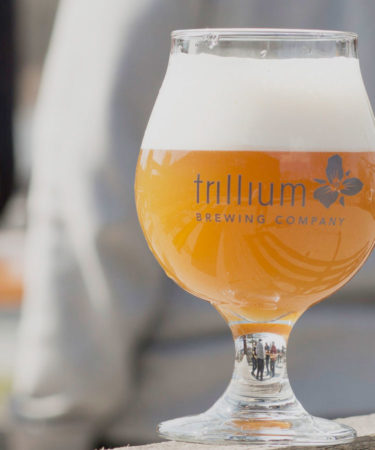Last week, a former employee of Trillium Brewing posted a personal statement on BeerAdvocate alleging unsavory practices that occurred at the brewery locations in Boston. These included cutting hourly wages from $8 to $5 (not cool), adding tequila to a beer it claimed was tequila barrel-aged (illegal), and selling growlers filled with trub (basically, end-of-keg hop sludge).
Trillium responded with a statement on its website and social media accounts saying the brewery pays its employees “in accordance with typical standards in the craft beer industry and with state and federal wage and hour laws.” It added that those employees who suffered pay cuts have had their original wages reinstated.
Needless to say, Trillium fans, and the craft beer community at large, are very upset.
This news about #TrilliumBrewing is an eye opener. Was looking for a PT job in the craft beer community. Applied and interviewed at #Trillium. Interview was literally 2 mins and at the hostess stand, based on recent articles. Blessing they never called back
— Eskimoflow (@eskimoflow) November 27, 2018
Ok re:Trillium I understand the outrage over the wages but no one seems to be freaking out about the allegation that they added liquor to beer instead of barrel aging it.
— Carla Jean (@beerbabe) November 27, 2018
“Treat your employees better and I’ll buy your beer again,” Caley O’Bryan of Norwalk, Conn., posted on Trillium’s Facebook page.
“The only reason I don’t want to see this brewery crash and burn is it’s hardworking [sic] employees. Beyond that, I hope they fail,” Joshua Noel of Cambridge, Mass., wrote.
If Trillium is dosing its beer with hard liquor, that’s also a big problem. “At best that practice is deceptive and disingenuous, and, at worst, illegal,” Matt Osgood, Boston-based beer writer and VinePair contributor, wrote in an email.
These allegations against Trillium exemplify the multifaceted problems facing craft brewers and the craft beer industry today. First, the straightforward issue with a relatively easy fix: Tipped employees don’t get paid enough, in beer or elsewhere. Trillium employees told The Boston Globe that customers often aren’t aware the staff relies on tips. Breweries should take it on themselves to educate their customers on what is and isn’t appropriate in their taprooms and stores (tip jars work wonders).
The second, more systemic problem, is that some breweries focusing on growth do so at the expense of employees’ well-being and the integrity of their products. You don’t want to get so big so quickly that you risk shortchanging your staff or your customers. That’s just bad for business.
Big Beer Continues to Shrink, but What’s Growing Is Bad for Craft
Imported beer, craft beer, and flavored malt beverages (FMBs) are all on the rise, while domestic premium beer is slowly sinking, according to a recent IRI report.
Volume sales of FMBs are up more than 11 percent; imports are up more than 5 percent; and craft beer is up more than 1 percent. Big Beer volume sales, meanwhile, are down. Anheuser-Busch is down 2.2 percent, MillerCoors is down 3.1 percent, and Heineken is down 5.7 percent, Brewbound reports.
Don’t get it twisted — domestic premium beers still dominate. Budweiser, Bud Light, Heineken, and Coors Light are still among the top-selling beers in the world. But they are slowly inching down the totem pole, while other beer and beer-like beverages climb.
This is a good thing for craft breweries, as Americans are clearly developing our taste for things other than macro lagers. To me, though, it raises another question: Should breweries embrace FMBs or try to bypass them? I admittedly took issue with the Brewers Association’s idea to change the “craft brewer” definition (again), but maybe the BA was onto something. FMBs are outpacing craft beer growth. Adapting to what people want is essential to the success of this industry. Unfortunately for us beer lovers, what people want is apparently hard soda.
Peter Bouckaert Joins Melvin Brewing’s Board of Directors
Former New Belgium brewmaster and Purpose Brewing and Cellars founder Peter Bouckaert told Forbes earlier this month that he would be joining Melvin Brewing’s board of directors.
Melvin Brewing, based Wyoming, was involved in a sexual misconduct scandal earlier this year.
I find Bouckaert’s move disappointing, and his point of view worrisome. Speaking to Forbes’ Tara Nurin (also a VinePair contributor), he said he was “amazed” at how Melvin handled the situation, and that the brewery’s management is “a motivator.”
We’re talking about the same brewery that made light of child sexual assault.
As an industry, and as beer consumers, we have to decide where to draw our lines. Personally, I lost my taste for Melvin’s beers after learning of their notoriously inappropriate conduct. This week, many are claiming to boycott Trillium due to its current scandal.
Although some argue beer and politics should be separate, I feel that they are inherently intertwined. Just as actors are passing up opportunities to work with Woody Allen, or aspiring chefs have seen a fallen hero in Gabrielle Hamilton, we should think twice before supporting those who abuse their power.
